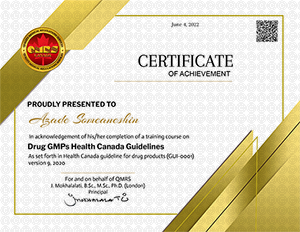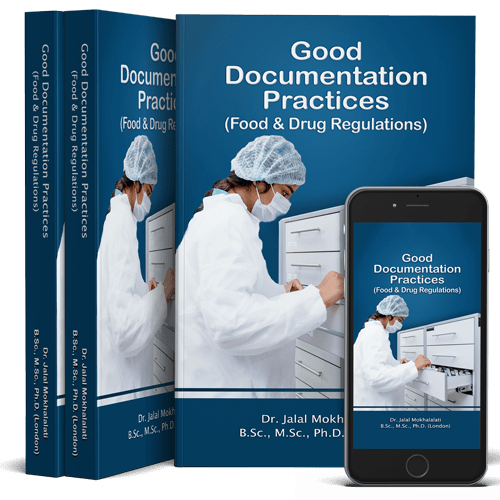Objective
1. To provide the trainees with the needed information and skills to build a good documentation system;
2. To assist QA personnel to develop an SOP and establishing objective evidence for activities performed (records keeping);
3. To teach participants how to control, monitor and record all activities that directly or indirectly impact the quality of health products;
4. To identify the documents requirements for manufacturing health products as stipulated by the WHO, European Commission and US-FDA.
Learning Outcome
After completing this course, the participants should be knowledgeable on:
1. The basic writing skills and step-by-step descriptions of how to write a Standard Operating Procedure in an informative manner.
2. The methods to fulfill the record-keeping requirements for activities performed or results achieved.
3. The documents requirements for manufacturing health products as stipulated by the WHO, European Commission, Health Canada and US-FDA guidance documents.
Who will benefit
1. Regulatory and QA assurance personnel;
2. Operational (production) managers and
3. Marketing personnel and senior managers.
Course Contents
1. Document’s purpose, types, and characteristics;
2. Documents development, and management;
3. SOPs general format;
4. Documents categories; and Required Documents
Sources(Guidelines)
1. American National Standards. Quality Management System (Fundamentals and Vocabulary, and QMS. ANSI/ASQ Q9000:2000 and ANSI/ASQ Q9001:2000.
2. European Commission Health and Consumers Directorate-General (2010). Volume 4 Good Manufacturing Practice Medicinal Products for Human and Veterinary Use Chapter 4: Documentation
3. Health Canada: GMPs guide for drug products (GUI-0001), July 1, 2020.
4. Health Canada: Natural and Non-prescription Health Products Directorate. Good Manufacturing Practices Guidance Document (Version 3.0) December 1, 2015.
5. US-FDA, Current Good Manufacturing Practice for Finished Pharmaceuticals (PART 211), Content current as of 09/21/2020.
6. US Environmental Protection Agency. Guidance for Preparing Standard Operating Procedures (SOPs) EPA QA/G-6 (May 2021).
7. WHO: GMPs for pharmaceutical products: main principles in WHO Expert Committee on Specifications for Pharmaceutical Preparations. Thirty-seventh report. Geneva, 2003, Annex 4 (WHO Technical Report Series, No. 908).
Know your instructor
Dr. Jalal Mokhalalati, B.Sc., M.Sc., Ph.D.
Dr. Mokhalalati holds a Ph.D. degree in the field of human nutrition from University of London. Since his graduation in 1981, he wrote a number of books and scientific papers, and he worked in various countries for different sectors, including teaching at the University of Gaza.
In 2001, Dr. Mokhalalati retired from Abbott Laboratories as the Head of Medical and Regulatory Affairs Department in S. Arabia and started his own consultation office in Canada to serve the food & drug industry in all aspects of establishment licensing (GMPs), and Health Products registration with Health Canada.

Certification
Trainees who complete the course and accomplish at least a 75% score will receive a “Certificate of Achievement” from QMRS
Course Curriculum
Good Documentation Practices (Food & Drug Regulations)
-
Introduction
-
Module One: Fundamentals & Standard Operating Procedure
-
Module Two: SOPs Development and Management
-
Module Three: SOPs General Format
-
Module four: Documents Categories and Required Documents
-
Summary
-
Apendices
-
Course Completion
Test your Knowledge
-
Certificate Requirements
-
GDP – The Quiz
Download Course
-
Course Content in PDF
00:00 -
Course Content in PowerPoint
00:00
-
LevelExpert
-
Duration6 hours
-
Last UpdatedAugust 2, 2023


